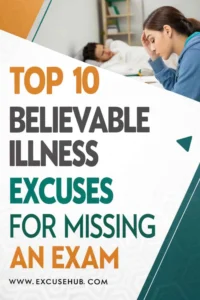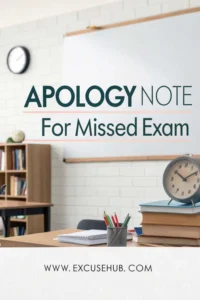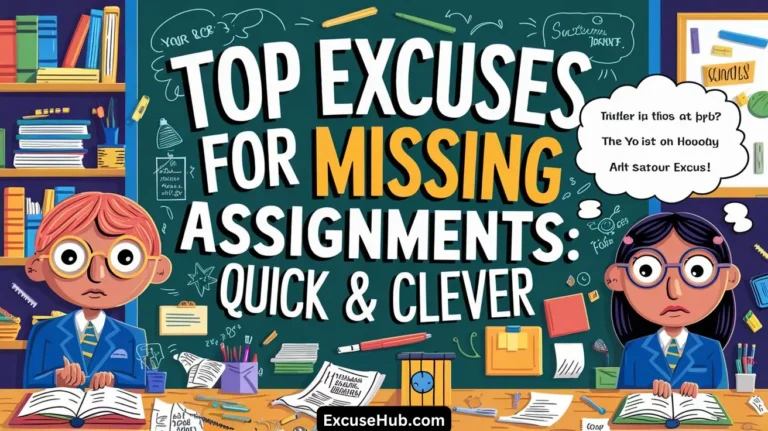Best Excuses for Missing an Exam: Clever and Convincing
If you miss an exam, you need credible excuses for missing an exam to communicate effectively. Common justifications include sudden illnesses, like the flu or food poisoning, which usually require a doctor’s note.
Family emergencies, such as unexpected hospitalizations or funerals, also warrant understanding and usually involve necessary documentation. Transportation issues can arise, and showing proof of delays can strengthen your case.
Authenticity is essential; avoid unverifiable social media claims. Clear communication with your instructor is important, demonstrating responsibility and respect.
By exploring these concepts further, you’ll uncover strategies to effectively address your absence and maintain your academic integrity.
Top 10 Believable Illness Excuses For Missing an Exam

Missing an exam can be stressful, but sometimes you genuinely don’t feel well. If you need a believable illness excuse, here are 10 solid options, each with a short example to make it sound convincing.
🤕 1. Severe Migraine
Excuse: “I had an intense migraine that left me unable to focus or function properly.”
Example: “The pain was so bad that even light and noise made it worse, and I had to stay in a dark room all day.”
🤢 2. Food Poisoning
Excuse: “I ate something bad and ended up with severe food poisoning.”
Example: “I spent the whole night vomiting and feeling nauseous, so I couldn’t even think about leaving my house.”
🤧 3. Bad Case of the Flu
Excuse: “I was running a high fever and felt completely drained.”
Example: “I had body aches, chills, and a sore throat so bad that I could barely talk, let alone concentrate on an exam.”
🤮 4. Stomach Virus
Excuse: “A sudden stomach virus left me feeling extremely weak and dehydrated.”
Example: “I had nonstop diarrhea and nausea, making it impossible to even sit through an exam without needing a bathroom break every few minutes.”
😷 5. Severe Allergic Reaction
Excuse: “My allergies flared up badly, making it impossible to function normally.”
Example: “My face was swollen, my eyes were red and watery, and I could barely breathe due to a blocked nose.”
🤕 6. Intense Back Pain or Muscle Spasm
Excuse: “I had a sudden muscle spasm that made it painful to move.”
Example: “Even sitting for more than a few minutes caused extreme discomfort, and I could barely walk without pain.”
😨 7. Anxiety or Panic Attack
Excuse: “I had a panic attack right before the exam and couldn’t calm down in time.”
Example: “My heart was racing, my hands were shaking, and I felt like I couldn’t breathe, making it impossible to focus.”
🌡️ 8. High Fever and Weakness
Excuse: “I woke up with a fever so high that I could barely get out of bed.”
Example: “I was sweating one minute and shivering the next, with zero energy to even sit through an exam.”
🦷 9. Severe Toothache or Dental Emergency
Excuse: “A sudden tooth infection left me in unbearable pain.”
Example: “The pain was so sharp that I couldn’t eat, talk, or focus, and I had to see a dentist immediately.”
🤢 10. Reaction to Medication
Excuse: “A new medication caused severe dizziness and nausea.”
Example: “After taking it, I felt lightheaded, nauseous, and too disoriented to leave my house safely.”
💡 Tip: Keep your excuse realistic and, if possible, back it up with a doctor’s note! 😷
When it comes to missing an exam due to illness, having a believable excuse can make all the difference. Understanding your school’s policies is vital, as they often outline what constitutes an acceptable excuse.
Generally, schools require documentation, like a doctor’s note, to verify claims. This not only helps you adhere to school policies but also reinforces ethical considerations in your academic environment.
Consider common ailments like a severe cold, flu, or food poisoning. These conditions are relatable and often require rest and recovery, making them believable. You might also mention headaches or stomach issues, which can strike suddenly and leave you unable to concentrate.
It’s essential to remain truthful while maneuvering through these situations. Misrepresenting your health can have consequences that extend beyond a single exam.
Instead, focus on communicating your genuine situation to your instructor. If you truly feel unwell, don’t hesitate to reach out for support.
Acceptable Reasons to Miss an Exam (No Fail Excuses!)

We all know that sometimes life throws unexpected challenges our way, making it hard to attend an exam. Here are some acceptable reasons for missing an exam, each with a brief example to make it more believable.
🤒 1. Medical Emergency
Excuse: “I had a sudden medical emergency that required immediate attention.”
Example: “I was rushed to the hospital with severe chest pain and had to be monitored for several hours.”
🤧 2. Severe Illness
Excuse: “I was extremely sick and unable to get out of bed.”
Example: “I had a high fever, body aches, and couldn’t even keep water down for the entire day.”
🚗 3. Family Emergency
Excuse: “A close family member was involved in an accident, and I had to take care of them.”
Example: “I had to be there for my parent who was suddenly hospitalized, and there was no one else to help.”
📅 4. Religious or Cultural Observance
Excuse: “I had an important religious or cultural event that coincided with the exam.”
Example: “I had a pre-arranged religious observance that was crucial for my family, and it couldn’t be rescheduled.”
👨👩👧 5. Death of a Loved One
Excuse: “I lost a loved one and was grieving during the exam period.”
Example: “I had to attend the funeral and take care of necessary arrangements, which left me emotionally and physically drained.”
🚌 6. Transportation Issues
Excuse: “I encountered unexpected transportation problems that caused me to miss the exam.”
Example: “My car broke down on the way to the exam, and I couldn’t find a quick solution in time.”
⏰ 7. Personal Health Issues (Not an Emergency)
Excuse: “I was dealing with a chronic health condition that flared up unexpectedly.”
Example: “My condition worsened, and I couldn’t get out of bed due to severe pain and fatigue.”
🎓 8. Miscommunication or Scheduling Error
Excuse: “There was a misunderstanding about the exam time or date.”
Example: “I thought the exam was scheduled for a different time, and I only realized my mistake too late.”
💻 9. Technical Issues (For Online Exams)
Excuse: “I experienced unexpected technical issues during the online exam.”
Example: “My internet connection failed, and I couldn’t access the exam platform despite repeated attempts.”
💪 10. Mental Health Crisis
Excuse: “I was experiencing a mental health crisis that made it impossible to focus on the exam.”
Example: “I was dealing with severe anxiety and panic attacks, which made it difficult to sit for the exam.”
💡 Tip: Be honest and communicate early with your instructor if something unexpected happens!
Valid Good Medical Reasons for Missing an Exam (No Worries!)

There are times when your health needs to come first, and missing an exam due to illness is completely understandable. Here are unique and valid medical reasons for missing an exam, each with a clear example to help explain the situation.
🤕 1. Severe Migraine
Excuse: “I was hit with an intense migraine that left me unable to focus or even sit upright.”
Example: “The headache was so severe that it caused nausea and blurred vision, making it impossible to study or attend the exam.”
🤢 2. Food Poisoning
Excuse: “I experienced severe food poisoning and was physically incapacitated the whole day.”
Example: “I had uncontrollable vomiting, stomach cramps, and fever, which left me too weak to even leave the bathroom.”
🤧 3. Influenza (Flu)
Excuse: “I came down with the flu, leaving me bedridden with a high fever and exhaustion.”
Example: “I couldn’t even leave my bed as my body ached, and I had chills and fever, making it impossible to focus.”
🤮 4. Acute Stomach Virus
Excuse: “I contracted a stomach virus that caused severe abdominal pain and vomiting.”
Example: “I couldn’t keep food down and had to rush to the bathroom frequently, leaving me unable to sit for the exam.”
🌡️ 5. Sudden High Fever
Excuse: “A sudden spike in my fever left me physically drained and unable to attend the exam.”
Example: “I was suffering from body aches, chills, and a fever of over 103°F, which left me exhausted and confused.”
🤕 6. Severe Back Pain
Excuse: “I experienced debilitating back pain, which made it impossible to sit through the exam.”
Example: “The pain was so intense that I couldn’t even lie down comfortably, let alone sit through an exam.”
🤧 7. Allergic Reaction
Excuse: “I had a severe allergic reaction that caused swelling and difficulty breathing.”
Example: “My face swelled up, and I couldn’t breathe properly, so I had to seek immediate medical attention.”
🦷 8. Dental Emergency
Excuse: “I experienced a sudden dental emergency that needed urgent treatment.”
Example: “I had a tooth fracture that caused excruciating pain, and I had to get it treated immediately, which made me miss the exam.”
😷 9. Upper Respiratory Infection
Excuse: “I caught a viral respiratory infection that made it impossible to sit through the exam.”
Example: “I had a cough, sore throat, and congestion, and I felt completely drained and feverish the entire day.”
🌿 10. Chronic Condition Flare-Up
Excuse: “A chronic condition I have suddenly flared up, leaving me unable to function.”
Example: “I suffer from an autoimmune disorder, and a flare-up left me feeling fatigued, with pain and inflammation in my joints.”
💡 Tip: Always try to inform your instructor as soon as possible when facing any medical issues, so they are aware and can provide support!
Excuses to Skip an Exam (Legit & Guilt-Free!)

Sometimes life throws unexpected challenges your way, and you might need to skip an exam. Here are legitimate and guilt-free excuses to miss your exam, each one different and valid.
🤕 1. Severe Migraine
Excuse: “I was struck with an excruciating migraine that left me unable to concentrate or leave my bed.”
Example: “The migraine was so severe that it caused nausea, sensitivity to light, and dizziness, preventing me from attending the exam.”
🤢 2. Food Poisoning
Excuse: “I was hit with food poisoning and couldn’t even keep water down, let alone attend the exam.”
Example: “I was vomiting non-stop and had intense stomach cramps, making it impossible to even think about anything other than recovery.”
🤧 3. Bad Cold or Flu
Excuse: “I came down with a nasty cold that left me feverish, exhausted, and too sick to go anywhere.”
Example: “I had a high fever, a sore throat, and congestion, and I felt too weak to make it to the exam.”
🤮 4. Stomach Bug
Excuse: “A sudden stomach virus struck me, and I was bedridden all day.”
Example: “I had severe stomach cramps, vomiting, and diarrhea, and I couldn’t leave the bathroom long enough to attend my exam.”
🌡️ 5. High Fever
Excuse: “I developed a fever that left me feeling dizzy and disoriented, unable to focus on anything.”
Example: “My fever was over 102°F, and I was shivering and sweating, making it impossible to get out of bed and prepare for the exam.”
🦷 6. Dental Emergency
Excuse: “I had an unexpected dental emergency that required immediate attention.”
Example: “A broken tooth left me in excruciating pain, and I needed to go to the dentist right away, which made it impossible to attend the exam.”
🤕 7. Back Injury
Excuse: “I experienced a sudden back injury that left me unable to sit or walk comfortably.”
Example: “I pulled a muscle in my back and couldn’t even stand up without pain, so attending the exam was simply not an option.”
😷 8. Respiratory Infection
Excuse: “I caught a respiratory infection, and my lungs felt congested, making it hard to breathe.”
Example: “I had a persistent cough, shortness of breath, and fever, leaving me unable to concentrate or get to the exam on time.”
🌿 9. Chronic Health Condition Flare-Up
Excuse: “A flare-up of my chronic illness left me feeling exhausted and in pain.”
Example: “I have a condition that flares up periodically, and the symptoms left me weak and unable to attend the exam.”
🤧 10. Allergic Reaction
Excuse: “I had an unexpected allergic reaction that required medical attention.”
Example: “My allergy symptoms worsened suddenly, and I had difficulty breathing and swelling, making it impossible to focus or attend the exam.”
💔 11. Family Emergency
Excuse: “A sudden family emergency came up, and I had to be there for my loved ones.”
Example: “A family member was in the hospital, and I had to rush to provide support, leaving me no time to attend the exam.”
🎓 12. Mental Health Crisis
Excuse: “I had a mental health emergency that required me to take the day to recover.”
Example: “I was dealing with severe anxiety and stress, and I was not in a condition to take the exam without risking my well-being.”
🧳 13. Travel-Related Issues
Excuse: “Unexpected travel complications delayed my arrival, and I couldn’t make it in time.”
Example: “Due to flight cancellations and delays, I couldn’t reach campus in time for the exam, even though I had planned ahead.”
💡 Pro Tip: Always reach out to your instructor as soon as possible if you’re unable to attend an exam, and offer to reschedule if needed. Your health and well-being come first!
Common Excuses for Family Emergencies (When Missing an Exam)

Family emergencies can happen suddenly, and you may need to miss an exam. Here are unique and genuine excuses for family emergencies that can help explain why you missed your exam.
🚨 1. Medical Emergency of a Family Member
Excuse: “A family member had a sudden medical emergency that required immediate attention.”
Example: “My sibling was rushed to the ER with a serious injury, and I had to be there to support them.”
🛑 2. Death in the Family
Excuse: “A close relative passed away, and I had to attend the funeral and take care of arrangements.”
Example: “My grandmother passed away unexpectedly, and I had to travel out of town for the funeral and family gathering.”
🚑 3. Hospitalization of a Parent
Excuse: “My parent was hospitalized with a serious condition, and I was the primary caregiver.”
Example: “My mom had to undergo an emergency surgery, and I had to stay at the hospital with her, which caused me to miss the exam.”
👶 4. Childcare Emergency
Excuse: “I had a childcare emergency where my babysitter canceled last minute, and I couldn’t leave my child unattended.”
Example: “I had to stay home to care for my child when my babysitter couldn’t make it, and I missed the exam as a result.”
🔨 5. Sudden Home Repair Crisis
Excuse: “A major home repair issue occurred, and I had to handle it immediately.”
Example: “A burst pipe flooded our home, and I had to oversee emergency repairs to prevent further damage.”
💔 6. Family Member’s Mental Health Crisis
Excuse: “A family member went through a severe mental health crisis that required my immediate presence.”
Example: “My sibling had a breakdown, and I had to be there to help them through the situation and ensure their safety.”
🚘 7. Family Car Accident
Excuse: “A family member was in a car accident, and I had to rush to the scene to ensure their well-being.”
Example: “My father was involved in a car accident, and I had to be there to provide support and assist with transportation to the hospital.”
🗣️ 8. Family Member in a Domestic Violence Situation
Excuse: “A family member was in a dangerous domestic violence situation, and I had to intervene.”
Example: “My cousin was in an abusive situation, and I had to go help them safely leave and find shelter.”
💼 9. Family Business Crisis
Excuse: “There was an urgent issue with my family’s business that I had to handle personally.”
Example: “A major issue arose at the family business, and I had to step in and help resolve it immediately, missing my exam in the process.”
📅 10. Unexpected Family Visit
Excuse: “A close relative arrived unexpectedly from abroad, and I had to host them for the day.”
Example: “My aunt flew in for a short visit, and due to limited time, I had to attend to her and missed my exam.”
⚖️ 11. Legal Emergency
Excuse: “There was an urgent legal situation involving a family member that required my presence in court.”
Example: “I had to attend an emergency court hearing for my father’s legal case, which overlapped with the exam time.”
🔒 12. Family Member in Custody
Excuse: “A family member was unexpectedly taken into custody, and I had to assist with their release.”
Example: “My brother was arrested, and I had to assist with bail arrangements, which meant I missed the exam.”
💡 13. Family Caregiving Situation
Excuse: “I became the primary caregiver for a relative who suddenly needed full-time care.”
Example: “My aunt had a stroke, and I needed to help care for her and coordinate medical appointments, so I couldn’t attend the exam.”
🧳 14. Family Relocation Emergency
Excuse: “There was an emergency relocation situation within my family that I had to handle immediately.”
Example: “My parents had to relocate due to an unexpected job transfer, and I had to assist with packing and moving.”
💡 Tip: It’s important to inform your professor as soon as possible and, if necessary, provide documentation to support your excuse. Family emergencies are valid reasons, and understanding your situation can help you reschedule exams.
Family emergencies can arise unexpectedly, often leaving you in a difficult position regarding exams or important deadlines. In these urgent situations, you might find yourself scrambling for justifiable excuses. Understanding common scenarios can help you navigate these challenges.
Consider these typical family-related emergencies:
- A sudden hospitalization of a close family member
- An unexpected funeral that requires your attendance
- A major home crisis, like a fire or flood
These unexpected events can disrupt your plans and create significant stress. It’s vital to address the situation promptly and communicate your circumstances to your instructors.
While it’s important to be honest, a brief explanation of your situation often suffices. Most educators recognize that family emergencies can happen to anyone and may provide you with the necessary accommodations.
Don’t hesitate to reach out—clear communication can foster understanding. Document any relevant details, such as medical notes or funeral arrangements, if needed.
Creative and Unique Excuses for Missing an Exam (Weather Included)

Weather can sometimes be unpredictable, causing disruptions that lead to missing exams. Here are unique, creative excuses that incorporate weather conditions and other personal situations.
🌧️ 1. Flash Flooding Blocked Roads
Excuse: “Flash flooding in my area flooded the streets, and I was unable to leave my house safely to attend the exam.”
Example: “Heavy rains caused flash floods, and the roads were impassable, leaving me stuck at home during the exam.”
❄️ 2. Snowstorm Stranded Me
Excuse: “A sudden snowstorm hit, and I was snowed in, unable to make it to the exam location.”
Example: “The unexpected snowstorm left my car trapped in a snowbank, preventing me from attending the exam on time.”
🌪️ 3. Tornado Warning in My Area
Excuse: “A tornado warning was issued, and I had to seek shelter, causing me to miss the exam.”
Example: “A tornado watch was declared in my region, and I had to stay in a safe space until the danger passed.”
☀️ 4. Extreme Heatwave Caused Health Issues
Excuse: “The intense heatwave caused dehydration and heat exhaustion, making it impossible for me to attend the exam.”
Example: “I was feeling unwell due to the sweltering heat, and my doctor advised me to stay hydrated and rest for the day.”
🌬️ 5. Strong Winds Knocked Power Out
Excuse: “Strong winds knocked out the power in my area, disrupting my ability to prepare for or attend the exam.”
Example: “A power outage caused by high winds prevented me from reviewing my materials or traveling to the exam site.”
🌧️ 6. Heavy Rain Caused Traffic Jams
Excuse: “Torrential rain caused severe traffic delays, and I was unable to reach the exam in time.”
Example: “The heavy downpour led to accidents on the roads, which caused a massive traffic jam, delaying my arrival.”
⚡ 7. Lightning Strike Caused Power Surge
Excuse: “A lightning strike caused a power surge, damaging my laptop and preventing me from preparing for the exam.”
Example: “The lightning knocked out the power in my area, leaving me without internet access and unable to complete my last-minute revision.”
🌪️ 8. Dust Storm Left Roads Unsafe
Excuse: “A sudden dust storm made visibility poor, and I couldn’t safely drive to the exam center.”
Example: “The dust storm reduced visibility to almost zero, and the roads became too hazardous for travel.”
💨 9. Windstorm Damaged My Vehicle
Excuse: “A windstorm caused tree branches to fall on my car, damaging it and leaving me stranded.”
Example: “The strong winds caused a tree to fall on my vehicle, and I couldn’t find an alternative way to get to my exam.”
❄️ 10. Ice Storm Created Dangerous Conditions
Excuse: “An unexpected ice storm made the roads too dangerous to drive, preventing me from reaching my exam.”
Example: “The roads were covered in ice, and I didn’t feel it was safe to drive in such conditions, so I missed the exam.”
🌫️ 11. Fog So Dense, I Couldn’t Drive
Excuse: “Dense fog settled over the city, making it impossible to drive safely to the exam.”
Example: “The fog was so thick I couldn’t see more than a few feet ahead, so I couldn’t make it to the exam on time.”
🌪️ 12. Hailstorm Damaged Public Transportation
Excuse: “A hailstorm caused damage to the public transportation system, leaving me stranded and unable to make it to the exam.”
Example: “The hailstorm damaged buses and trains, which caused a delay and left me unable to attend my exam.”
☔ 13. Sudden Rain Flooded My Area
Excuse: “The rain was so heavy that it flooded my street, preventing me from leaving my house to attend the exam.”
Example: “The rain came down so hard that it flooded the main road, making it impossible to drive to the exam center.”
💡 Tip: If you need to use weather-related excuses, try to notify your professor ahead of time and provide as much detail as possible to ensure they understand the situation. Be sure to use these creatively, and remember that honesty is key!
Weather disruptions can throw a wrench in your plans, especially when it comes to exams. When you need a creative excuse, think outside the box.
Rather than just saying it was too rainy to leave the house, you could say a ‘miniature hurricane’ swept through your neighborhood, leaving your street unrecognizable—complete with a floating inflatable dinosaur! This humorous storm scenario not only lightens the mood but also captures attention.
Consider using playful metaphors, too. Describe how the snowstorm outside turned your driveway into a winter wonderland, where only the bravest of sledders dared to venture out. Such creative weather-related excuses make your situation relatable and memorable.
Remember, while originality is key, authenticity matters more. If you can weave in personal anecdotes about your weather-related misadventures, it adds credibility to your excuse.
In the end, the goal is to communicate your genuine struggle in a way that’s engaging and a bit humorous. So, embrace your creativity, and don’t shy away from turning a weather crisis into an interesting tale that your instructor won’t soon forget!
Best Excuses for Transportation Issues (Missed an Exam)

Transportation problems are often beyond our control and can sometimes lead to missing important events like exams. Whether it’s a breakdown, delay, or unforeseen circumstance, here are some valid excuses you can consider using when transportation issues cause you to miss your exam.
🚗 1. Car Broke Down
Excuse: “My car broke down on the way to the exam, and I was unable to get it repaired in time.”
Example: “My engine failed unexpectedly, and I had to wait for roadside assistance, which caused me to miss the exam.”
🚇 2. Train Delayed
Excuse: “There was an unexpected delay with the train, and I couldn’t make it to the exam on time.”
Example: “The train was stuck on the tracks for over an hour, and I missed my scheduled exam time.”
🚌 3. Bus Was Late
Excuse: “The bus was running significantly late due to traffic, and I couldn’t make it to the exam in time.”
Example: “The bus driver informed us that there was a major traffic jam, causing a long delay, and I couldn’t reach the exam center.”
🚗 4. Flat Tire
Excuse: “I got a flat tire on the way to the exam, and it took too long to change it.”
Example: “I was stuck on the side of the road trying to change my tire, and by the time I was ready, the exam had already started.”
🚖 5. Ride-Sharing Issues
Excuse: “The ride-share service I booked was delayed, and I couldn’t get to the exam location on time.”
Example: “My ride-share driver got lost and took a wrong turn, which delayed my arrival, and I missed the exam.”
Transportation issues can present a legitimate challenge when it comes to attending an exam. If you find yourself facing delays, it’s essential to communicate effectively with your instructor.
Public transport delays can happen unexpectedly, especially during rush hour. If this occurs, explain the situation promptly. Consider showing proof, like a ticket or an announcement from the transport service, which can strengthen your case.
Similarly, car breakdowns are often unavoidable. If your vehicle stops working en route, document the incident. Take photos of the malfunctioning car or keep a mechanic’s note if repairs are needed. This evidence can help validate your excuse.
Make sure you reach out to your school as soon as possible. Many institutions understand that life happens, and they often have policies in place for such situations. Be honest and provide as much detail as necessary. Remember, your credibility is key.
While transportation issues can be frustrating, handling them with transparency and responsibility can demonstrate your commitment to your education. Stay proactive in finding solutions, and don’t hesitate to reach out for support if needed.
How Tone and Body Language Impact Exam Excuses

When facing the challenge of missing an exam, how you communicate your situation matters just as much as the words you choose. Your tone and body language can greatly impact how your message is received. Nonverbal cues often speak louder than your words, so you need to be mindful of your delivery.
Consider these eWhen presenting excuses for missing an exam, your tone and body language can significantly influence how your excuse is received. The way you speak and present yourself can either strengthen or weaken the validity of your excuse. Let’s break it down:
1. Tone of Voice:
- Confidence vs. Hesitation 🗣️: A confident tone shows that you believe your excuse is valid. If you speak too hesitantly or unsurely, people might start to question your reason. Speak clearly and without stumbling to come across as more convincing.
- Empathy and Sincerity 💖: If you’re dealing with an emotional reason, like a family emergency or illness, using a sincere and empathetic tone helps convey your seriousness. Avoid sounding robotic or uncaring.
- Avoid Over-Apologizing 🙅♂️: Apologizing too much can seem insincere. A balanced tone that expresses regret without overdoing it shows you understand the situation but aren’t trying too hard to gain sympathy.
2. Body Language:
- Open and Relaxed Posture 🧘♀️: Body language that’s open and relaxed, like uncrossed arms and good posture, signals honesty and calmness. It helps others trust you and take your excuse seriously.
- Avoiding Shifty Movements 👀: If you’re fidgeting, avoiding eye contact, or making anxious gestures (like touching your face), it could suggest you’re uncomfortable or being dishonest. Stay still and composed to show confidence.
- Mirroring the Listener’s Body Language 🤝: Subtly matching the listener’s posture or facial expressions can build rapport and trust. If they’re calm, reflect that calmness in your own posture to seem more authentic.
- Facial Expressions 😌: Your face should mirror your words. If you’re explaining an illness, a slight expression of discomfort or concern is more believable. A forced smile during a serious conversation can seem fake.
3. Consistency Between Words and Non-Verbal Cues 🔄:
- The best excuses are the ones where your words align with your tone and body language. If you say, “I’m so sorry I missed the exam because of a family emergency,” but your tone sounds indifferent and your body language is defensive, it may raise doubts. Authenticity is key!
- Authenticity Matters 🕵️♀️: When everything matches — your words, tone, and body language — your excuse comes across as genuine. Any inconsistency could make others question your sincerity.
4. Cultural Considerations 🌏:
- Remember, tone and body language can vary greatly by culture. What might be polite and respectful in one culture could come off as evasive or insincere in another. Being mindful of these differences can help you communicate more effectively.
5. The Power of Silence 🤫:
Silence can be a powerful tool. Pausing before explaining your excuse allows you to appear thoughtful and deliberate, making you seem more genuine. Rushing through an excuse may seem like you’re trying too hard to convince others.
Text Message Templates for Missing an Exam

When you miss an exam, sending a polite and clear text message to your instructor or professor is essential to explain the situation. Below are some detailed text message templates you can customize based on your specific reason for missing the exam.
These templates are professional, respectful, and designed to convey your situation without sounding too casual or dismissive.
1. Template for Illness:
Subject: Missed Exam Due to Illness 🤒
Hi [Instructor’s Name],
I hope you are well 🙏. Unfortunately, I was unable to attend the exam on [Date] due to being unwell. I’m experiencing [briefly mention symptoms or condition if appropriate] and wasn’t able to make it 💔. I would appreciate it if we could discuss possible options for rescheduling the exam or an alternative arrangement 🙌. Please let me know if you need any documentation 📝. Thank you for your understanding 💙.
Best regards,
[Your Name]
2. Template for Family Emergency:
Subject: Unable to Attend Exam Due to Family Emergency 🚨
Hi [Instructor’s Name],
I’m reaching out to inform you that I missed the exam on [Date] due to a family emergency 💔. I apologize for not being able to attend and understand the importance of the exam. Could we please discuss the possibility of rescheduling or an alternative solution? 🙏 Thank you for your consideration, and I appreciate your understanding 🌸.
Best regards,
[Your Name]
3. Template for Transportation Issues:
Subject: Missed Exam Due to Transportation Delay 🚗💨
Hi [Instructor’s Name],
I hope you’re doing well 🌟. Unfortunately, I missed the exam on [Date] because of an unexpected transportation issue 🛑. [Briefly describe the issue—e.g., car breakdown, public transport delay] 🚉. I sincerely apologize for the inconvenience 🙇♀️. Could we possibly discuss any options to make up the exam or reschedule it ⏰? Thank you for your time and understanding 💫.
Best regards,
[Your Name]
4. Template for Personal Health or Mental Health Issues:
Subject: Missed Exam Due to Health Concerns ❤️🩹
Hi [Instructor’s Name],
I regret to inform you that I was unable to attend the exam on [Date] due to health issues 🏥. I’ve been dealing with [briefly describe health situation—e.g., mental health, anxiety, stress] 🧠 and was unable to focus adequately for the exam 😔. Could we discuss potential options to make up the exam? I’m happy to provide any necessary documentation 📝. I appreciate your understanding 🙏.
Best regards,
[Your Name]
5. Template for Pre-Approved Absence (e.g., Medical or Academic):
Subject: Missed Exam Due to Pre-Approved Absence ✅
Hi [Instructor’s Name],
I wanted to follow up regarding the exam on [Date] 🗓️. As previously discussed, I was unable to attend due to [briefly mention the pre-approved reason, e.g., medical procedure, academic conference] ✈️. I understand this may cause inconvenience, and I would appreciate it if we could discuss how to proceed 💬.
Best regards,
[Your Name]
6. Template for Unexpected Situation:
Subject: Missed Exam Due to Unforeseen Circumstances 💥
Hi [Instructor’s Name],
I hope you’re well 🌻. Unfortunately, I missed the exam on [Date] due to unforeseen circumstances that I couldn’t predict or control 🚧. I sincerely apologize for any disruption this has caused 🙇♂️ and would appreciate the opportunity to discuss how to make up the exam or any other potential solutions 💡. Thank you for your understanding 🌸.
Best regards,
[Your Name]
7. Template for Travel Delays (e.g., Flight Delay or Cancellation):
Subject: Missed Exam Due to Travel Delay ✈️
Hi [Instructor’s Name],
I hope all is well 🌟. I wanted to inform you that I was unable to attend the exam on [Date] due to a travel delay 🛑. [Briefly explain situation, e.g., flight cancellation, travel disruption] 🛫. I apologize for missing the exam and would greatly appreciate your guidance on any potential make-up exam or alternative arrangements 📝.
Best regards,
[Your Name]
8. Template for Accidental Oversight or Mistake:
Subject: Missed Exam Due to Scheduling Error 📅
Hi [Instructor’s Name],
I hope you’re doing well 🌷. I’m writing to apologize for missing the exam on [Date] ⏳. Unfortunately, I made a mistake with the exam schedule and wasn’t aware of the time conflict ⏰. I sincerely regret this oversight and would like to discuss whether there’s any possibility of rescheduling or making up the exam 📚.
Best regards,
[Your Name]
Key Tips for Writing a Polite and Effective Text 📝:
- Be Brief but Detailed: Stick to the important facts 🔑. Briefly explain why you missed the exam without being overly detailed or apologetic 💬.
- Take Responsibility: Acknowledge that missing the exam is your responsibility ✅, even if it was due to unavoidable circumstances.
- Request Alternatives: Politely ask if there are any options to reschedule or make up the exam ⏳, and express your willingness to follow any guidelines or provide documentation 📝.
- Be Professional: Use formal language 👔 and avoid slang or casual tone. Remember, this is a communication with a professor or instructor.
- Proofread Your Message: Before sending the message, double-check for typos or mistakes 🧐 to ensure that you appear respectful and professional.
Using these templates with emojis will make your message more engaging while maintaining a respectful and professional tone.
Apology Note for Missed Exam

If you missed an exam, it’s important to communicate with your instructor or professor promptly and respectfully. A well-written apology note helps convey responsibility and shows that you are taking the matter seriously. Below is a detailed apology note template for missing an exam, enhanced with emojis to make it more engaging and personal.
1. Apology Note for Missing an Exam Due to Illness 🤒
Hi [Instructor’s Name],
I hope this message finds you well 🙏. I’m writing to sincerely apologize for missing the exam on [Date] 🗓️. Unfortunately, I’ve been unwell with [briefly mention symptoms or condition if appropriate] 🤧, and I wasn’t able to attend. I truly regret not being able to participate in the exam, as I understand how important it is 📚.
Could we possibly discuss any options for rescheduling or an alternative arrangement? 🕰️ I’m more than happy to provide any necessary documentation from my doctor 🏥. Thank you so much for your understanding, and I appreciate your time 💙.
Best regards,
[Your Name]
2. Apology Note for Missing an Exam Due to a Family Emergency 🚨
Hi [Instructor’s Name],
I hope you’re doing well 🌸. I’m writing to express my sincere apologies for missing the exam on [Date] 🙇♀️. Unfortunately, a family emergency arose, and I had to attend to urgent matters 🏡.
I understand the importance of the exam and deeply regret not being able to make it ⏳. Would you be willing to discuss options for a make-up exam or any alternative solution? I would really appreciate your guidance 🙏.
Thank you so much for your understanding 💖.
Best regards,
[Your Name]
3. Apology Note for Missing an Exam Due to Transportation Issues 🚗💨
Hi [Instructor’s Name],
I hope this note finds you well 🌟. I’m really sorry that I missed the exam on [Date] ⏰. Unfortunately, I ran into unexpected transportation issues 🛑 (e.g., traffic, car breakdown, public transport delay) that prevented me from getting to the exam on time 🚧.
I understand how important this exam is, and I take full responsibility for the situation 🙏. Could we please discuss any possible alternatives, like rescheduling or making up the exam? Your guidance would mean a lot to me 🌸.
Thank you for your patience and understanding 💙.
Best regards,
[Your Name]
4. Apology Note for Missing an Exam Due to Personal or Mental Health Issues 💔
Hi [Instructor’s Name],
I hope you’re doing well 💐. I wanted to apologize for missing the exam on [Date] 🗓️. Unfortunately, I’ve been dealing with some personal health challenges recently 🧠❤️, and it impacted my ability to attend the exam.
I understand that this may be an inconvenience, and I am truly sorry for not being able to make it 🙇♂️. I would appreciate it if we could discuss any options for rescheduling or alternative solutions 🙏.
Thank you so much for your understanding and support 💙.
Best regards,
[Your Name]
5. Apology Note for Missing an Exam Due to Travel Delays ✈️
Hi [Instructor’s Name],
I hope you’re doing great 🌟. I’m very sorry for missing the exam on [Date] ⏳. I was traveling at the time, and due to an unexpected delay or cancellation of my flight 🚨, I was unable to return on time for the exam 🛫.
I understand how important it is, and I regret the situation 💔. Could we possibly discuss any available options for making up the exam or rescheduling? Your understanding would be greatly appreciated 🙏.
Thank you for your time and consideration 💖.
Best regards,
[Your Name]
6. Apology Note for Missing an Exam Due to Accidental Oversight 🗓️
Hi [Instructor’s Name],
I hope you’re doing well 🌷. I’m writing to sincerely apologize for missing the exam on [Date] 📅. I made an accidental oversight and didn’t realize the exam was scheduled for that day. I take full responsibility for this mistake 🙇♀️ and deeply regret not being there.
Would you be willing to discuss any possibilities for rescheduling or making up the exam? I understand that this is my fault, and I’m more than happy to cooperate with any guidelines you suggest 📝.
Thank you so much for your understanding 💙.
Best regards,
[Your Name]
Tips for Writing an Apology Note 📝:
- Be Sincere and Apologetic 🙇♂️: Always express genuine regret for missing the exam. Avoid making excuses—just explain your situation honestly and politely.
- Take Responsibility ✅: Acknowledge that you missed the exam, regardless of the reason. This shows maturity and accountability.
- Provide a Reason (if applicable) 💡: Briefly explain why you missed the exam, but avoid oversharing or providing too many details.
- Ask for Alternatives 💭: Politely ask if there are any possibilities for making up the exam or if alternative arrangements can be made.
- Express Gratitude 💖: Thank your instructor for their time and understanding. Gratitude can go a long way in ensuring a positive response.
- Be Professional and Respectful 👔: Even though emojis add a friendly tone, maintain professionalism in your message. Be clear and concise, and avoid slang or casual language.
Sending an apology note with sincerity, professionalism, and a polite request for a solution will increase your chances of getting a positive response from your instructor. Adding emojis can help convey warmth and respect, but always ensure the overall message remains clear and professional.
Conclusion
In the end, while it’s tempting to stretch the truth, honesty is often the best policy. You might find yourself in a tight spot, but being straightforward can build trust with your educators. If you genuinely need to miss an exam, use the templates provided to communicate effectively.
Remember, it’s better to face the music than to risk the consequences of a fib. Stay proactive, and you’ll navigate these challenges with confidence and integrity. For those in need of excuses for missing an exam, understanding how to address your absence honestly is crucial.
Frequently Asked Question
1. What are some valid excuses for missing an exam?
Valid excuses include medical emergencies, family emergencies, transportation issues, or unforeseen personal circumstances. It’s important to notify the instructor as soon as possible and provide documentation if required.
2. How can I request to reschedule my missed exam?
To request a reschedule, reach out to your instructor as soon as possible. Be polite and explain the reason you missed the exam. Offer to provide supporting documents if necessary, and ask if there are any options for rescheduling or making up the exam.
3. Can I miss an exam if I have a doctor’s note?
Yes, a doctor’s note can be a valid excuse for missing an exam, especially if you’re seriously ill or have a medical condition. Make sure to contact your instructor as soon as possible and submit the doctor’s note if required.
4. Is it acceptable to miss an exam due to personal reasons?
While personal reasons such as mental health issues or family matters can be considered valid excuses, it’s best to inform your instructor beforehand. Be honest and provide as much detail as needed to explain the situation.
5. What should I do if I miss an exam due to an unavoidable circumstance?
If you miss an exam due to an unavoidable circumstance, contact your instructor immediately. Explain the situation, apologize for the inconvenience, and inquire about possible alternatives, such as rescheduling or completing the exam at a later date.







